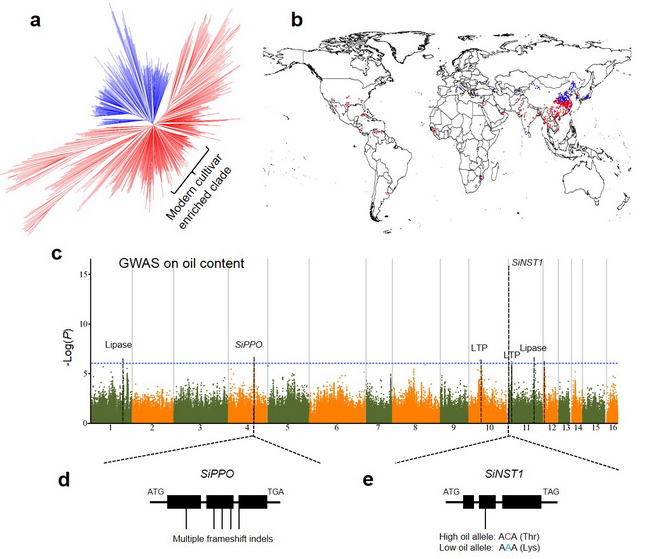Large Scale GWAS of Sesame Completed
Date:2015/11/03 Hits:
Construction of superhigh density haplotype map and research of large scale GWAS (genome wide association analysis) of important agronomic traits were completed by the sesame genetic and breeding innovation team which is leaded by Professor Zhang Xiurong of oil research institute. In this research, they identified a plenty of associated locus and candidate genes of oil and yield related traits. This work will lay the foundations for genetic improvement and genetic analysis of important agronomic traits in sesame. And it will provide missive basic data and reference of genetic research and molecular breeding in other oilseed crops. The main results have been published in the Nature Communications on Oct 19, 2015.
Sesame is an important oilseed crop with high oil content.. Previous studies showed that sesame is diploid plant with small genome, an ideal species for oil related traits research. Based on the sesame genome that sequenced by the sesame research team, they collected 705 sesame accessions from 29 countries and resequenced these materials, 500 Mb SNPs were obtained and a high density haplotype map was constructed. Genetic and structure analysis of the samples suggested that sesame could be divided into two ecological groups, the south and north group. GWAS were performed for 56 oil and yield related traits, 549 associated SNPs and 46 candidate genes were identified.
Genetic analysis of oil content in sesame seed revealed that seed oil content was not only regulated by enzymes of lipid metabolic, but also by seed coat color gene SiPPO and lignin synthesize gene SiNST1. This result provide a new idea for oil content improvement in oilseed crops. GWAS of fatty acid composition indicated that KASI, DGAT, FATA, FATB, SAD genes involved in fatty acid synthesize in sesame, implying that a simple network of sesame lipid metabolic was constructed. The researcher also found multiple yield related genes and accumulation of the superior alleles is the one of the main reason for high yield in modern varieties.
This work was funded by the National Program on Key Basic Research Projects of China, National Natural Science Foundation of China, Agricultural Science and Technology Innovation Project of Chinese Academy of Agricultural Sciences, Project of Crop Germplasm Resources Protection, China Agriculture Research System, and Core Research Budget of the Non-profit Governmental Research Institution.
